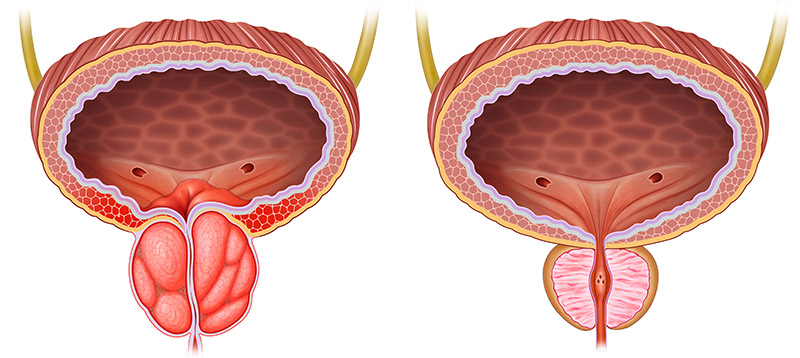
Prostate conditions
The prostate gland is a male reproductive organ that produces fluids which protect and feed sperm cells. If you're a man in your 50s or 60s, it's important to discuss having your prostate gland checked with your doctor. Checking your prostate is even more important if you have a family history of prostate disease.
The symptoms of prostate problems
The symptoms of prostate conditions may include problems with bladder control and urinating. Bladder control is how well you can start, delay, or stop urination. Prostate problems can cause you to:
- Urinate frequently
- Have a big urge to rush to the bathroom, only to find you can only urinate a little or not at all
- have a weak urine stream
- Dribble or leak urine
Types of prostate problems
Benign Prostatic Hyperplasia
Benign prostatic hyperplasia refers to the enlargement of the prostate gland. An enlarged prostate can cause some uncomfortable urinary symptoms, such as blocking the flow of urine from the bladder. It can also cause kidney, bladder, or urinary tract problems.
Treatment for Benign Prostatic Hyperplasia
There are many effective treatments for prostate gland enlargement, including medications, surgery and minimally invasive therapies. To choose the best option, Dr Pluke will consider your symptoms, the size of your prostate and other health conditions.
As a specialist in modern prostate surgery, Dr Pluke provides various options to help treat BPH.
Water Vapor Therapy is a minimally invasive procedure that delivers steam up the urethra to eleviate symptoms of BPH. The process is quick and can be done in Dr Pluke’s doctors rooms. The benefits include being able to urinate normally, going off medication and improved sleep.
Laser Prostate Surgery uses a scope with a laser to remove part of the prostate blocking the urinary tract. This allows for the urinary tract to open again and alleviate the symptoms of BPH. Dr Pluke inserts the scope through the urethra and it travels up to the prostate, and then a laser is passed through the scope to cut away at the excess tissue.
Prostate Cancer
Prostate cancer occurs when cells in the prostate gland start to grow out of control. Most forms of prostate cancers grow slowly and are confined to the prostate gland, where they may not necessarily cause serious harm. Although some types of prostate cancer grow slowly and may need minimal or no treatment, other types are aggressive and may spread quickly.
Treatment for prostate cancer
Prostate cancer treatment options depend on many factors, such as whether it has spread, how fast the cancer is growing, overall health, and the potential benefits or side effects of the treatment. Low-grade prostate cancer may not need treatment right away or will require a 'wait and see' approach. Dr Pluke specialises in using brachytherapy and surgery as treatment therapy.
Brachytherapy is an internal radiation treatment in which seeds, ribbons, or capsules that contain a radiation source gets placed inside or near the tumour. Brachytherapy is a minimally invasive treatment as it only treats the part of the body affected with cancer.
Surgery is most commonly used in the early stages of prostate cancer when it has not spread past the prostate. Dr Pluke specialises in radical prostatectomy that removes the cancerous tissue from the prostate gland. The surgery involves making an incision, either in the abdomen or scrotum, to access the prostate and remove part of the prostate and nearby tissue.